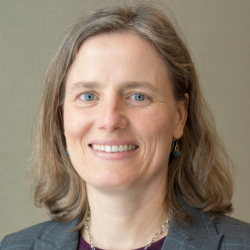Dr. Sonia Wesche is an Associate Professor in Environmental Studies and Indigenous Studies at the University of Ottawa. She has worked collaboratively with Indigenous communities in the Northwest Territories and Yukon, Canada for more than a decade to better understand their vulnerability and capacity to adapt to environmental change (and also has a newer project in Nunavut). Her multi-disciplinary research draws on multiple sources of knowledge, with a focus on local and traditional knowledge and knowledge co-production. She is particularly interested in links among environmental change, traditional land and resource use, food and water security, and health and well-being in Indigenous communities.
Sonia Wesche

Profile
Faculty of Arts
Biography
Research
Sonia Wesche’s research focuses on the human dimensions of environmental change, more specifically on climate change impacts, vulnerability, adaptation, food and water security, and health and well-being in Indigenous communities. She works collaboratively with Indigenous communities and organizations in the Canadian North. Recent projects have focused on resilience in community-based traditional food systems; identifying and addressing water security issues in Nunavut communities; links between climate change, food security and community health; and community vulnerability and adaptation to environmental change in a social, economic and environmental sectors.
Type of Student Support Sought
Dr. Wesche seeks students with a strong academic background, an interest in (or previous experience) working on environmental issues relevant to Indigenous (or other marginalized) communities, and a desire to apply rigorous analysis (qualitative, participatory or quantitative) to address issues of concern to northern community members and/or policy-makers.
Research Question Examples for Prospective Students
- Can we project future food security implications in a northern region by applying downscaledclimate scenarios?
- How can we adapt the current water security paradigm to address freshwater challenges in northern Indigenous communities?
- What are key linkages between Indigenous food security and water security, and how can these be addressed?
- What are appropriate governance mechanisms for adapting to changing food security challenges in the North?
- In which ways can local and traditional knowledge (LTK) be scaled up to improve northern water governance at a regional scale?